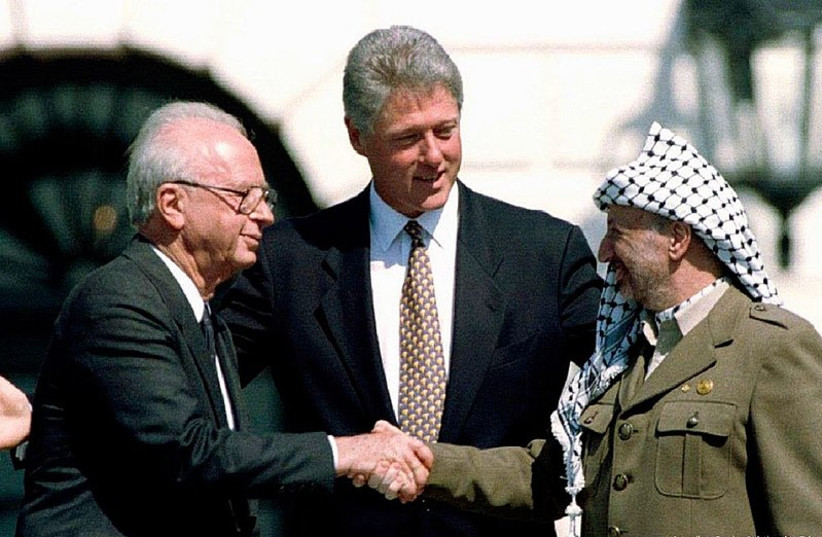“Palestinians renew threat to nix agreements with Israel,” read the headline to a story in Wednesday’s Jerusalem Post.
According to the story by Khaled Abu Toameh, Palestinian officials are threatening to rescind the Oslo Accords, cut off security cooperation and demand one democratic state – instead of a two-state solution – if Israel does not recognize an independent Palestinian state with east Jerusalem as its capital along the pre-1967 lines.
In addition, the Palestinian leadership has decided to dispatch envoys to several countries urging them to pressure Israel, and Palestinian Authority President Mahmoud Abbas is planning a visit to Russia to get Moscow to do the same and press Israel into committing to a two-state solution. Maybe, in Moscow, an idea first broached in 2007, a Russian-sponsored international conference on the Middle East, will be floated yet again.
Abu Toameh’s story, with a slight change of the names of some of the officials quoted inside, could have been written in 2005, 2010 and 2015. It is as if time has stood still, as if the Palestinians have a set diplomatic menu from which they call in an order from time to time. Nothing has changed. Not the threats to scrap Oslo, stop security cooperation with Israel or lobby the world to step up the pressure on the Jewish state.
One staple on that menu that was not mentioned this time, at least not yet, was that Abbas would resign, something he has threatened to do – but has failed to deliver on – numerous times in the past.

What is clear from these tired threats, and the same old pattern of actions – saying all signed agreements will be canceled, going to Moscow, threatening to revoke recognition of Israel – is that the PA has no idea what to do next diplomatically.
The diplomatic process has ground to a halt, the Americans – realizing that it is not going anywhere right now – have pushed it way down their list of priorities, and the PA leadership has no idea of how to further its aims.
So it reverts to the default option: threats.
THERE ARE two problems with that option, however. The first is that these threats have been issued so often in the past that they simply don’t move anybody. They are empty. And the second problem is that using these threats has not worked.
The PA leadership has not moved any closer to its goals by threatening to break off agreements with Israel or get an international conference convened. Issuing these threats may serve a domestic political need to flex a muscle from time to time, to show the home audience that the leadership is doing something, but it is having exactly no impact on Israeli policy, and not doing much either in terms of mobilizing international involvement.
All these threats do is demonstrate that the Palestinian leadership is out of ideas. Short of complaining that Israel is an apartheid state committing ethnic cleansing and trying to get the International Criminal Court to step in, it has no fresh propositions to put forward.
Not, mind you, that the Israeli government is bursting with them. But it is trying to put forth a more constructive approach, though others will argue that the recent announcement about a plan to advance construction of more than 3,000 homes beyond the Green Line is anything but helpful. Even there, however, that announcement was preceded by approval of some 1,300 units for Palestinians in the West Bank, as well as the granting of legal status to some 4,000 Palestinians living there – types of “constructive gestures” toward the Palestinians not seen in years.
This is all part of an idea that has taken hold in the Bennett government of “shrinking the conflict,” making life for the Palestinians easier, improving the economic conditions in the West Bank, and promoting economic independence there, even while acknowledging that an overall peace settlement is nowhere in the offing.
Prime Minister Naftali Bennett has not taken this idea, developed by Micah Goodman – who reportedly has Bennett’s ear – as far as Goodman would like, but it is still something.
Goodman’s idea is for more than just an “economic peace,” but actually for Israel to give the Palestinians more area to control, a direction that Yair Lapid could conceivably follow if/when he becomes premier in August 2023.
Even if Bennett is not going as far as Goodman might like, he is still pushing something positive.
The PA leadership, on the other hand, is just going back to the same slogans and the same methods, vainly hoping that this time they will render a significantly different result. They won’t.
Some new ideas, new thinking, new approaches are badly needed out of Ramallah. The PA needs to come up with something better than the “same old, same old,” because that has proven to be a path leading nowhere.
